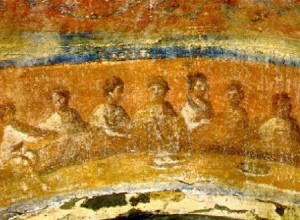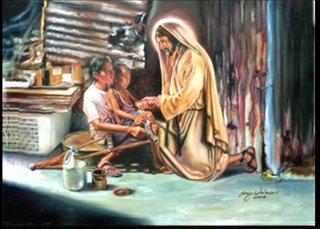Thesis: Followers of Jesus will suffer and be
persecuted in their lives. They need not
seek this out, but they should expect it and rejoice when it comes, they should not
avoid it, and not fight against it.
In the end, it is only through suffering that we are saved. Even as the first baptism takes us ritually
through death into the life of Jesus, so suffering, the second baptism, takes
us through death into the resurrection from the dead in Jesus.
All who desire to live godly in Christ Jesus will be
persecuted.
II Timothy 3:12
I Peter 2:19-21
A disciple is not above his teacher, nor a slave above his
master. It is enough for the disciple that he become like his teacher, and the
slave like his master. If they have called the head of the house Beelzebul, how
much more will they malign the members of his household!
Matthew 10:24-25
If the world hates you, you know that it has hated Me before
it hated you. If you were of the world, the world would love its own; but
because you are not of the world, but I chose you out of the world, because of
this the world hates you. Remember the word that I said to you, 'A slave is not
greater than his master.' If they persecuted Me, they will also persecute you;
if they kept My word, they will keep yours also. But all these things they will
do to you for My name's sake, because they do not know the One who sent Me.
John 15:18-21
Fixing our eyes on Jesus, the author and perfecter of faith,
who for the joy set before Him endured the cross, despising the shame, and has
sat down at the right hand of the throne of God. For consider Him who has
endured such hostility by sinners against Himself, so that you will not grow
weary and lose heart. You have not yet resisted to the point of shedding blood
in your striving against sin.
Hebrews 12:2-4
Blessed are those who have been persecuted for the sake of
righteousness, for theirs is the kingdom of heaven. Blessed are you when people
insult you and persecute you, and falsely say all kinds of evil against you
because of Me. Rejoice and be glad, for your reward in heaven is great; for in
the same way they persecuted the prophets who were before you.
Matthew 5:10-12
We exult in our tribulations, knowing that tribulation brings about perseverance; and perseverance, proven character; and proven character, hope; and hope does not disappoint, because the love of God has been poured out within our hearts through the Holy Spirit who was given to us.
Romans 5:3-5
John 12:24-27
Truly I say to you, there is no one who has left house or
brothers or sisters or mother or father or children or farms, for My sake and
for the gospel's sake, but that he will receive a hundred times as much now in
the present age, houses and brothers and sisters and mothers and children and
farms, along with persecutions; and in the age to come, eternal life.
Mark 10:29-30
The Spirit Himself testifies with our spirit that we are
children of God, and if children, heirs also, heirs of God and fellow heirs
with Christ, if indeed we suffer with Him so that we may also be glorified with
Him. For I consider that the sufferings
of this present time are not worthy to be compared with the glory that is to be
revealed to us.
Romans 8:16-18
I rejoice in my sufferings for your sake, and in my flesh I
do my share on behalf of His body, which is the church, in filling up what is
lacking in Christ's afflictions.
Colossians 1:24
He has said to me, "My grace is sufficient for you, for
power is perfected in weakness." Most gladly, therefore, I will rather
boast about my weaknesses, so that the power of Christ may dwell in me. Therefore
I am well content with weaknesses, with insults, with distresses, with
persecutions, with difficulties, for Christ's sake; for when I am weak, then I
am strong.
II Corinthians 12:9-10
If anyone wishes to come after Me, he must deny himself, and
take up his cross and follow Me. For whoever wishes to save his life will lose
it, but whoever loses his life for My sake and the gospel's will save it.
Mark 8:34-35
Brother will betray brother to death, and a father his
child; and children will rise up against parents and have them put to death. You
will be hated by all because of My name, but the one who endures to the end, he
will be saved.
Mark 13:12-13
Through many tribulations we must enter the kingdom of
God.
Acts 14:22








